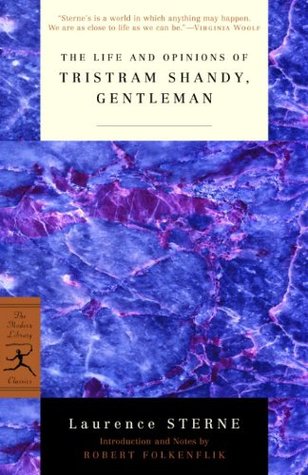More on this book
Community
Kindle Notes & Highlights
… of all the several ways of beginning a book which are now in practice throughout the known world, I am confident my own way of doing it is the best——I’m sure it is the most religious——for I begin with writing the first sentence——and trusting to Almighty God for the second.
[w]riting, when properly managed, (as you may be sure I think mine is) is but a different name for conversation: As no one, who knows what he is about in good company, would venture to talk all;—so no author, who understands the just boundaries of decorum and good breeding, would presume to think all: The truest respect which you can pay to the reader’s understanding, is to halve this matter amicably, and leave him something to imagine, in his turn, as well as yourself. For my own part, I am eternally paying him compliments of this kind, and do all that lies in my power to keep his imagination
...more
The Dedication of Tristram Shandy to Pitt accounts for the book as part of “a constant endeavour to fence against the infirmities of ill health, and other evils of life, by mirth; being firmly persuaded that every time a man smiles, – but much more so, when he laughs, that it adds something to this Fragment of Life.”
My way is ever to point out to the curious, different tracts of investigation, to come at the first springs of the events I tell;—not with a pedantic Fescue,8—or in the decisive Manner of Tacitus,9 who outwits himself and his reader;—but with the officious humility of a heart devoted to the assistance merely of the inquisitive;–to them I write,——and by them I shall be read,——if any such reading as this could be supposed to hold out so long, to the very end of the world.
By this contrivance the machinery of my work is of a species by itself; two contrary motions are introduced into it, and reconciled, which were thought to be at variance with each other. In a word, my work is digressive, and it is progressive too,—and at the same time.
Digressions, incontestably, are the sunshine;——they are the life, the soul of reading;—take them out of this book for instance,–you might as well take the book along with them;
from the beginning of this, you see, I have constructed the main work and the adventitious parts of it with such intersections, and have so complicated and involved the digressive and progressive movements, one wheel within another, that the whole machine, in general, has been kept a-going;—and, what’s more, it shall be kept a-going these forty years, if it pleases the fountain of health to bless me so long with life and good spirits.
There are others again, who will draw a man’s character from no other helps in the world, but merely from his evacuations;—but this often gives a very incorrect out-line,—unless, indeed, you take a sketch of his repletions13 too; and by correcting one drawing from the other, compound one good figure out of them both.
Writing, when properly managed, (as you may be sure I think mine is) is but a different name for conversation:1 As no one, who knows what he is about in good company, would venture to talk all;—so no author, who understands the just boundaries of decorum and good breeding, would presume to think all: The truest respect which you can pay to the reader’s understanding, is to halve this matter amicably, and leave him something to imagine, in his turn, as well as yourself.
Matters of no more seeming consequence in themselves than, “Whether my father should have taken off his wig with his right hand or with his left,”——have divided the greatest kingdoms, and made the crowns of the monarchs who governed them, to totter upon their heads.—But need I tell you, Sir, that the circumstances with which every thing in this world is begirt, give every thing in this world its size and shape;——and by tightening it, or relaxing it, this way or that, make the thing to be, what it is—great—little—good—bad——indifferent or not indifferent, just as the case happens.
in my opinion, to write a book is for all the world like humming a song—be but in tune with yourself, madam, ’tis no matter how high or how low you take it.
I humm’d—and a tolerable tune I thought it was; and to this hour, may it please your reverences, had never found out how low, how flat, how spiritless and jejune it was, but that all of a sudden, up started an air in the middle of it, so fine, so rich, so heavenly—it carried my soul up with it into the other world;
True Shandeism,5 think what you will against it, opens the heart and lungs, and like all those affections which partake of its nature, it forces the blood and other vital fluids of the body to run freely thro’ its channels, and makes the wheel of life run long and chearfully round.
Shall we be destined to the days of eternity, on holy-days, as well as working-days, to be shewing the relicks of learning, as monks do the relicks of their saints—without working one—one single miracle with them?
But this is neither here nor there—why do I mention it?——Ask my pen,—it governs me,—I govern not it.
That of all the several ways of beginning a book which are now in practice throughout the known world, I am confident my own way of doing it is the best——I’m sure it is the most religious——for I begin with writing the first sentence——and trusting to Almighty God for the second.1
For my own part, I am resolved never to read any book but my own, as long as I live.


